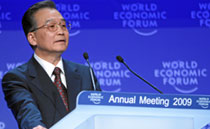
Smart Grids Key to Green Economies
A new World Economic Forum report to be presented at the “Summer Davos” in Tianjin, China, on September 13 concludes that smart grids are an essential infrastructure to a successful green economy. Developed by Accenture in collaboration with over 60 industry, policy, and regulatory participants, Accelerating Successful Smart Grid Pilots identifies the factors that determine the success, or failure, of smart grid pilots and offers practical recommendations to accelerate the success of smart grid initiatives. Espen Mehlum, Head of Electricity Industry at the World Economic Forum says, “With an estimated US$ 150 billion lost in a year in the US due to power cuts, smart grids can deliver a more reliable system with flexibility to utilize the full capacity of renewable energy. However, utilities are struggling to create the business case for smart grids, as regulatory incentives often fail to provide the right incentives and reflect the low-carbon agenda.”
Currently, 40 %of energy consumed is used to create electricity for systems that in most cases are over half a century old and in dire need of upgrading to support 21st century energy requirements. The report determined that implementing information and communication technologies would make the current grid smarter with significant increases in efficiency and carbon emissions reduction. Most western governments have already reached the same conclusion. Over the past year China alone has invested $7.3 billion on smart grid developments, followed by $4.5 invested by the United States. The report estimates there are around 90 pilots currently in effect globally.
Mark Spelman, Accenture’s Global Head of Strategy, observes, “Smart grids have the potential to cause a paradigm shift in our energy system – changing the way people and businesses interact with energy – and how value is created in the utility market. Smart grid pilots are an initial both exciting and fundamental step on the path to a low-carbon economy.” The report also stresses the integral role pilot projects can play in shaping a regulatory framework that rewards investor.
To read the full report go to: http://www3.weforum.org/docs/WEF_EN_SmartGrids_Pilots_Report_2010.pdf
Currently, 40 %of energy consumed is used to create electricity for systems that in most cases are over half a century old and in dire need of upgrading to support 21st century energy requirements. The report determined that implementing information and communication technologies would make the current grid smarter with significant increases in efficiency and carbon emissions reduction. Most western governments have already reached the same conclusion. Over the past year China alone has invested $7.3 billion on smart grid developments, followed by $4.5 invested by the United States. The report estimates there are around 90 pilots currently in effect globally.
Mark Spelman, Accenture’s Global Head of Strategy, observes, “Smart grids have the potential to cause a paradigm shift in our energy system – changing the way people and businesses interact with energy – and how value is created in the utility market. Smart grid pilots are an initial both exciting and fundamental step on the path to a low-carbon economy.” The report also stresses the integral role pilot projects can play in shaping a regulatory framework that rewards investor.
To read the full report go to: http://www3.weforum.org/docs/WEF_EN_SmartGrids_Pilots_Report_2010.pdf

